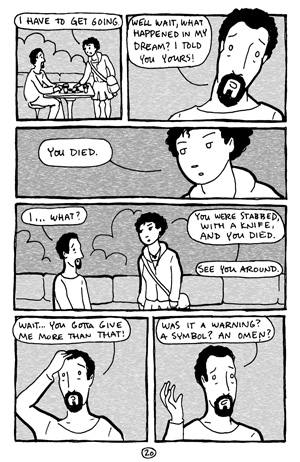INTERVIEW BY EMILE FERRIS
 Right up until 2004, Sarah Becan and M. Jason Robards were simply two artists who – as their website proclaims – liked making comics because it’s “art that reaches tons of people who’d never set foot inside of a SoHo gallery.”
Right up until 2004, Sarah Becan and M. Jason Robards were simply two artists who – as their website proclaims – liked making comics because it’s “art that reaches tons of people who’d never set foot inside of a SoHo gallery.”
But that year Becan and Robards became the founders of Shortpants Press, a boutique publishing venture that writer/reviewer Tom Spurgeon of the “Comics Reporter” has called “one of the half-dozen most reliable sources for quality mini-comics going right now.”
In this interview with Sarah Becan, F Newsmagazine comics editor Emile Ferris attempts to garner information about the comics scene, as well as the joys and pitfalls of self-publishing.
Emile Ferris: Why did you become a publisher?
Sarah Becan: I actually didn’t start out trying to be a publisher. When we came up with the name Shortpants Press, it was just a name for my friend Jason and I to exhibit under together. We were just a vanity press, putting out our own books. Then a friend approached us to see if we wanted to put out his book, and then another, and another. I realized there were a lot of artists out there who had lots of talent but maybe didn’t have the time or inclination or resources to self-publish. I work as a creative director and graphic designer, so I have access to high quality scanners, I know how to use all the computer programs, I know how to set up a multi-page file in printers’ spreads, and I have relationships with lots of print houses in the city. It made sense to use those resources to help out my fellow artists.
EF If you have seen an increase in the interest in comics and graphic novels, to what would you
attribute this heightened attention?
SB Well, certainly more and more mainstream movies seem to be coming to the comics world for film ideas, which eventually brings more people into the comic book stores. I think, at least I hope, more and more people are slowly starting to realize that there can be a depth of powerful storytelling in the comic book format.
EF What books are you most proud of publishing?
SB The one I’m most proud of is probably the first issue of the Shortpants Observer. It’s an anthology project, much like Blood Orange or Papercutter. We got four very talented comics artists – for this issue it was Corinne Mucha, Jeremy Tinder, Becca Taylor and Anya Davidson – and gave them free rein to do as many pages as they wanted. Each one turned out phenomenal work, and I had a great time putting the files together and laying them out in a book. It’s probably our most ambitious project to date, but the end result is just lovely.
EF What kind of submissions are you seeking?
SB Since we all have day jobs outside of Shortpants Press, we do have the sort of luxury of only putting out books that we’re really excited about. I’m very interested in anything different, unique, new; anything that tries to expand the definition of “comic book” and that wouldn’t fit in with the mainstream publishers. I’m a big fan of the literary approach, the content-driven approach, and of course anything handmade. I like a comic book to be an art object in its own right.
We’re not actively seeking out new things to publish right now, but I do always have my eye open for anything new and interesting. And I’m just as happy to talk someone through the process of self-publishing as I am to publish a new book.
 EF Within the comics community whose critical attention/opinion do you most respect?
EF Within the comics community whose critical attention/opinion do you most respect?
SB Oh, there are so many good people out there. I follow Joanna Draper Carlson at Comics Worth Reading, and of course Tom Spurgeon at the Comics Reporter. Douglas Wolk is an incredibly insightful comics reader. Although I don’t think I’ve ever geeked out so much as when one of my books got a good review from Thurston Moore, in Arthur’s Bull Tongue segment.
EF Do you go to comic conventions and if so, which do you find to be the best?
SB We do go to comic conventions. We’ve done Wizard World Chicago, SPX, APE—we’re actually getting ready to fly out for that one right now—TCAF in Toronto, Stumptown in Portland Oregon, and the new Windy City Comicon that just started up. I don’t know if I could tell you which one is best, they all have different nuances. Wizard World is its own animal, dominated by the mainstream companies and filled with people in costumes. SPX and APE, TCAF and Stumptown, they’re much more indie-centric, people who go to those shows are looking for things that are interesting and different. Stumptown seems especially receptive to handmade, handprinted things. TCAF, oddly, doesn’t seem nearly as interested in the DIY books, but they treat exhibitors extremely well. The Windy City Comicon is just getting its legs, but it’s a great convention. It’s up in Boystown, so it’s incredibly easy to get to, and it’s just a great mix of local talent.
EF Where do you see comics going in the future?
SB I’m afraid to even hazard a guess. I’ve heard people say that the graphic novel is going to supplant the prose novel as a popular form of storytelling, but I doubt that’ll happen in our generation. I would love to see comics achieve that level of legitimacy and respect, but I’m afraid it’s slow going. It’s partly because most people don’t think comics is capable of anything beyond superheroes and the funny pages, but it’s also partly because the comics world itself hasn’t done enough to undo that stereotype. Attitudes are shifting, on both sides, but change comes slowly.
EF What can you recommend in regards to self-publishing?
SB One of the best resources we’ve come across is “Whatcha Mean it’s a Zine” by Esther Watson. A lot of great comics artists and zinesters contributed, and it’s full of great information not just about the history of self-publishing, but also a lot of detailed information about how to physically print and assemble a book, information on silkscreening, binding, everything you could want to know.
EF What are the benefits of self-publishing and what are the pitfalls?
SB The pitfalls, of course, are that it’s a lot more work, and you’re using your own money to finance it. And it’s harder to get recognition, but the field is opening up more to self-publishers every day. The benefits of self-publishing are myriad. You’re your own boss, no one edits your work, no one tries to make it more “marketable”, you can dictate every aspect of your piece. You can make it exactly how you want it to be, and every time one sells, you get all the money.
EF Is distribution of self-published materials a tough nut to crack? How is it best done?
SB Distribution is definitely tricky. Lots of stores, especially the local Chicago ones, will take books on consignment, giving you 50% or so of the cover price. Our books are at Chicago Comics and Quimby’s, under deals like that. I know Graham Crackers and Comix Revolution do the same sort of deal too. So locally, distro is easy, but it requires some legwork.
Regionally or nationally, there really aren’t many distro houses in the game, which is unfortunate. Diamond rules the roost for comics distribution, but they’re hardly ever a viable option for the self-publisher. Bodega (http://www.bodegadistribution.com) does distribution for smaller runs, as does Last Gasp (http://www.lastgasp.com), but I know a lot of people who’ve had great luck with a guy named Tony Shenton. He’s just this guy in New York, a comics fan, who used to work in the industry. Now he takes on clients who self publish, and for a percentage of sales, he’ll take bulk orders for you from a bunch of comic book stores. He talks up your books to the stores, they place an order thru him, and suddenly you have 5 or 10 copies of your books selling at a handful of stores across the country. So there are definitely options for distribution, even if you’re just hand-assembling 100 copies of your book.
The best resource for the self-publisher, though, is definitely the Internet. It’s so easy these days, and almost free, to set up an online shop, take credit card info through Pay Pal, and ship things out yourself. It’s the best way to make money doing what we do, because for once no one’s taking a cut of the sales. And there are so many places to set up shop. You can go through Etsy, through eBay, Zen Cart, Cube Cart, Magento, there are tons of free and almost-free resources out there for setting up your own e-commerce.







